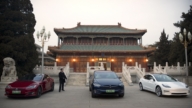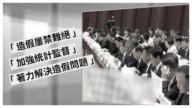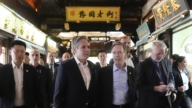【新唐人2013年05月18日訊】據傳,中共領導人習近平將在今年晚些時候公布改革計劃,並且為今後十年的發展制定日程。在天津考察的習近平強調,為保持中國社會經濟發展良好勢頭,需要進一步深化改革,而保障和改善民生,是習近平強調的重點。不過外界認為,這種不與政治體制改革同步進行的跛足經濟,已經證明是死路一條。
喉舌媒體報導,習近平在天津考察工作時強調,加強和改善黨的領導,是實現經濟社會持續健康發展的根本保障。習近平說,保持中國經濟社會發展良好勢頭,實現所謂「兩個一百年」奮鬥目標,都需要進一步深化改革,下大力氣解決體制機制弊端。
同時,總理李克強也表示,依靠政府投資和刺激取得經濟發展的空間已經不大,要激發市場機制的動力,轉變政府職能,推動經濟轉型。
但是,中國的經濟增長開始放緩,社會出現貧富分化,利益衝突頻發,中國如何擺脫經濟與社會困境,急需領導人找出突破口。
「英國廣播公司」《BBC》引述部分消息人士的警告說,有關改革會受到利益集團,特別是國企的抵制。
北京《國情內參》首席研究員鞏勝利:「現在重提改革,經濟改革已經到底了,一黨之下,全軍從政治經濟文化所有的產業都被獨家壟斷、獨家資源占有、獨家的霸道,光說沒有用啊,胡溫執政十年,溫家寶死都不明目,但改革走到哪裏了?大家都看得到啊!現在的中國改革關鍵是這個黨占有的資源太恐怖!份額太大,以至於老百姓的利益沒有人過問。」
時政評論家藍述認為,習近平現在重新提起改善民生的老套路,是為了緩和中國尖銳的社會矛盾,來延續中共的統治。
時政評論家藍述:「最主要的原因就是中共有特權,黨凌駕於一切之上,這個東西不改的話,他沒辦法去解決中國社會現在這種巨大的貧富差距造成的巨大的官民矛盾,在過去三十年裡,中共能夠改的實際上它都已經改了,只剩下唯一一個沒改的就是它這個政治體制。所以說,他要回去走抓民生的老路,不觸動它這個最根本的政治體制問題,他這條路就走不通了。」
藍述指出,正是這三十年避開政治體制改革的跛足經濟,才導致今天如此尖銳的社會矛盾,現在習近平還沿著這條路走,只能是死路一條。
鞏勝利:「中國的黨政運行成本之高是全球之最。那在這樣的環境下,習近平我不知道他怎麼樣再玩下去?特別是成本問題,包括黨的成本、包括維穩成本、包括企業生存的成本、包括政府的運行成本、還有老百姓生存的成本,老百姓生存其實很簡單:水、土、氣、電、煤,成本都在升高。這種升高對他的壓力也很大呀。」
鞏勝利指出,不管是法國還是美國,革命成功後,都是把權力歸還給了民眾,只有中共竊取政權後,把中國的政治資源、經濟資源、自然資源全部歸共產黨一身獨攬。
鞏勝利:「美國國民生產總值,2012年是15萬億多美元,而中國的國民生產總值只有6萬多億美金。中國花了大量的錢,超過美國一點五倍的錢只生產出來美國一半的財富都不到。」
那麼中共的領導是發展了中國的經濟,還是捆綁了中國的經濟呢﹖
《法國國際廣播電臺》報導,經濟恢復增長的預測因為首季出現的經濟放緩跡象,而失去了說服力。由於經濟增加的放緩,被視為天之驕子的大學生,對就業前景感到憂慮與無奈。
鞏勝利指出,大學生的就業和生存都遇到了新的問題。
採訪編輯/劉惠 後製/君卓
Xi Jinping Continues on Road of Crippled Economy
Reportedly, China will release later this year a reform plan
and an agenda on the next-10-year development.
Xi Jinping, the Chinese Communist Party(CCP) leader,
recently proposed to carry out in-depth reform,
in order to keep the momentum of China’s development.
Xi emphasized issues of improving people’s livelihood.
Experts indicate that China’s crippled economy,
which lacks political reform, has proved to be a dead end.
CCP official media have reported that Xi Jinping emphasized
the reinforcement and improvement of CCP leadership.
“This is a fundamental guarantee for the realization of
a healthy development of the economy and society,” he said.
Xi stated that deeper reform and tremendous effort
is needed to solve drawbacks of the system.
This needs to be done to maintain the momentum of
China’s economic and social development,
and to achieve the “Two Centurial”
goals of the Party.
Premier Li Keqiang said that it’s hardly likely that the
economy will be boosted by continuously relying on the
government’s investment and stimulation plan.
He proposed that is needed is revitalizing of the
market mechanism,
and the changing of government functions, along with
the pushing forward of economic restructure.
However, China’s economic growth has fallen.
The rich-poor gap has been widened, there is also
the increasingly frequent occurrence of social conflicts.
How can China pull itself out of the morass?
There is dire need of a solution from CCP leaders.
BBC quoted some sources’ warnings.
It said that relevant reform may be resisted by
interest groups, especially state-owned enterprises.
(Financial think-tank researcher, China) Gong Shengli:
“Now the issue of economic reform is raised again,
but the situation is at the end of its rope.
China is dominated by one Party, which monopolizes
all industries, all resources in areas of politics, economy and culture.
It’s useless to speak and not follow up with action.
10 years ruling of Hu and Wen, only regret left for Wen;
and now, what’s the reality of the promised reform?
As everyone had seen, the key issue of the reform
is that this Party has controlled too many resources,
at the end of the day, nobody attends to
the business of citizens.”
Critic Lan Shu says that Xi put forth the issue of
improving people’s livelihood, which is a routine CCP line.
He used it to reduce social conflicts and
prolong the CCP’s rule.
Lan Shu: “The main cause of conflicts is the CCP’s privilege,
the Party is above all.
If no change is made, Xi has no way to solve the huge
conflicts that exist between the regime and citizens.
These conflicts were caused by the tremendous gap
between the rich and the poor.
In the past 30 years, the CCP has changed all it can change,
only leaving its political system unchanged.
So if he wants to go back to raising the issue of livelihood,
but bypass the core issue—
that is, changing the political system,
he has no way to go ahead.”
Lan Shu interprets that China has developed a crippled
economy in the past 30 years, for avoiding of political reform.
This is the cause that there are continual and
serious social conflicts today.
So, currently Xi’s route is actually a dead end.
Gong Shengli: “The costs for running the CCP
and its government are the highest in the world.
So I can’t imagine how Xi Jinping will be able to manage
continuing along that same road.
In particular, the issue of cost figures, that includes the
cost of the Party’s operation, of maintaining stability,
of business survival, of running the government,
and also the cost of living.
Simply as: water, land, heating, gas, electricity, coal,
which have all increased in price.
Rising costs directly impact their day-to-day lives.”
Gong Shengli points out that in France or the USA,
after the revolutions succeeded,
both regimes use the power to serve their people.
Only the CCP, after taking power, has controlled
everything in politics and the economy,
not failing to miss out on control of
all natural resources.
Gong Shengli: “In 2012, the US GDP was over 15 trillion
dollars, whilst China’s was only over 6 trillion dollars.
That is, at huge expenses, the wealth produced in China
was less than half that of American citizens.”
Has the CCP leadership developed China’s economy
or has it restrained it?
Radio France Internationale said that economic slowdown
in the first quarter has invalidated the forecast
that China’s economic growth will return.
The weakening economy has made college graduates
feel worried and helpless in finding jobs, said the news.
Gong Shengli remarks that China’s college students now
face new problems in finding jobs and in their survival.



























